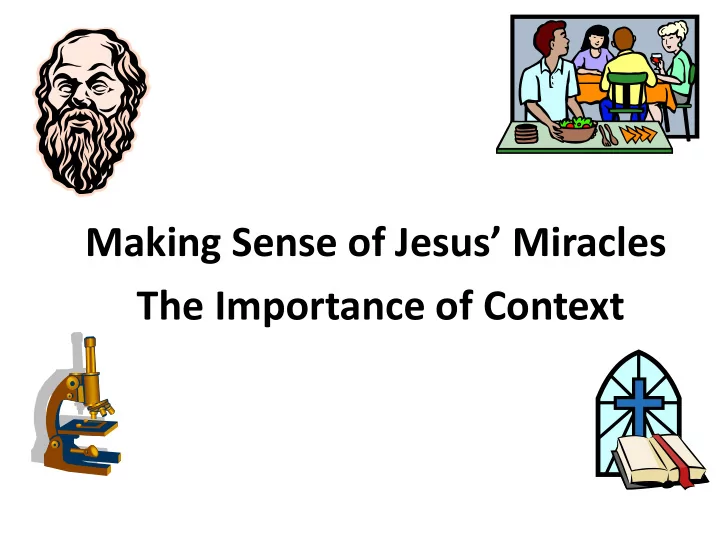

Making Sense of Jesus’ Miracles The Importance of Context
God’s Omnipotence Can God make a stone which is too heavy for him to lift?
David Hume (1711-1776) Empiricist Philosopher & Historian
David Hume Evidence – History – Reliability • ‘A wise man, therefore, proportions his belief to the evidence ’ • ‘We entertain a suspicion concerning any matter of fact when the witnesses contradict each other; when they are but few, or of a doubtful character; when they have an interest in what they affirm ’
Jesus teaches the People Everyday familiar life
Jesus raises Lazarus ( John 11 )
David Hume: Miracles, Laws of Nature • ‘A miracle is a violation of the laws of nature. And as a firm and unalterable experience has established these laws, the proof against a miracle, … is as entire as any argument from experience can possibly be imagined’ • ‘No testimony is sufficient to establish a miracle, unless the testimony be of such a kind, that its falsehood would be more miraculous, than the fact, which it endeavours to establish’
The Physical Sciences Compatible with the Miracles of Jesus? 𝑭 = 𝒏𝒅 𝟑
Science and Miracles: A Compatibility Model 1. Not a closed but an open Universe. 2. Not a strange physical causal explanation, but a personal explanation. 3. Nature works as it normally does, but there is a personal agency acting into the open causal complex of the world. There are no ‘violations’ of natural laws. 4. Historical records and evidence 5. God’s personal agency is a Best Explanation for the evidence
Contextual Problems • Detached from a religious context and from a scientific context – ‘Metaphysical Gap’ • Metaphysical Problems e.g. ‘open universe’, acts of a personal agent into the causal complex • How does a ‘best explanation’ evaluate metaphysical explanations – what does this mean? • Aligned with an everyday explanatory context which then projects explanations out of context We need to return to a proper context
Thomas touches the Wounds An Appropriate Context ( John 20:19-31 )
Uniformity of Nature – A Closed System? ‘The historical method includes the presupposition that history is a unity in the sense of a closed continuum of effects in which individual events are connected by the succession of cause and effect....This closedness means that the continuum of historical happenings cannot be rent by the interference of supernatural transcendent powers from beyond this world and that, therefore, there is no “miracle" in this sense of the word’ Rudolf Bultmann
Experience and Evidence After putting a book in a drawer, I assume it is there, unless… “Experience proves me right. There is no well attested case of a book’s simply disappearing.” It has often happened that a book has never turned up again, although we knew for certain where it was … Ludwig Wittgenstein, On Certainty
René Descartes (1596-1650) Progress in Philosophy? ‘I shall say nothing about philosophy, except that, seeing that it has been cultivated by the very best minds which have ever existed over several centuries and that, nevertheless, not one of its problems is not subject to disagreement, and consequently is uncertain … and seeing how many different opinions are sustained by learned men about one item … I took it to be tantamount to false which was merely probably’ René Descartes, Discourse I
Making Sense of Doubt ‘If you tried to doubt everything you would not get as far as doubting anything. The game of doubting itself presupposes certainty ’ Wittgenstein, On Certainty
What is Philosophy? ‘Philosophy is a battle against the bewitchment of our intelligence by means of language.’ Wittgenstein, Philosophical Investigations
Questions & Discussion
Recommend
More recommend